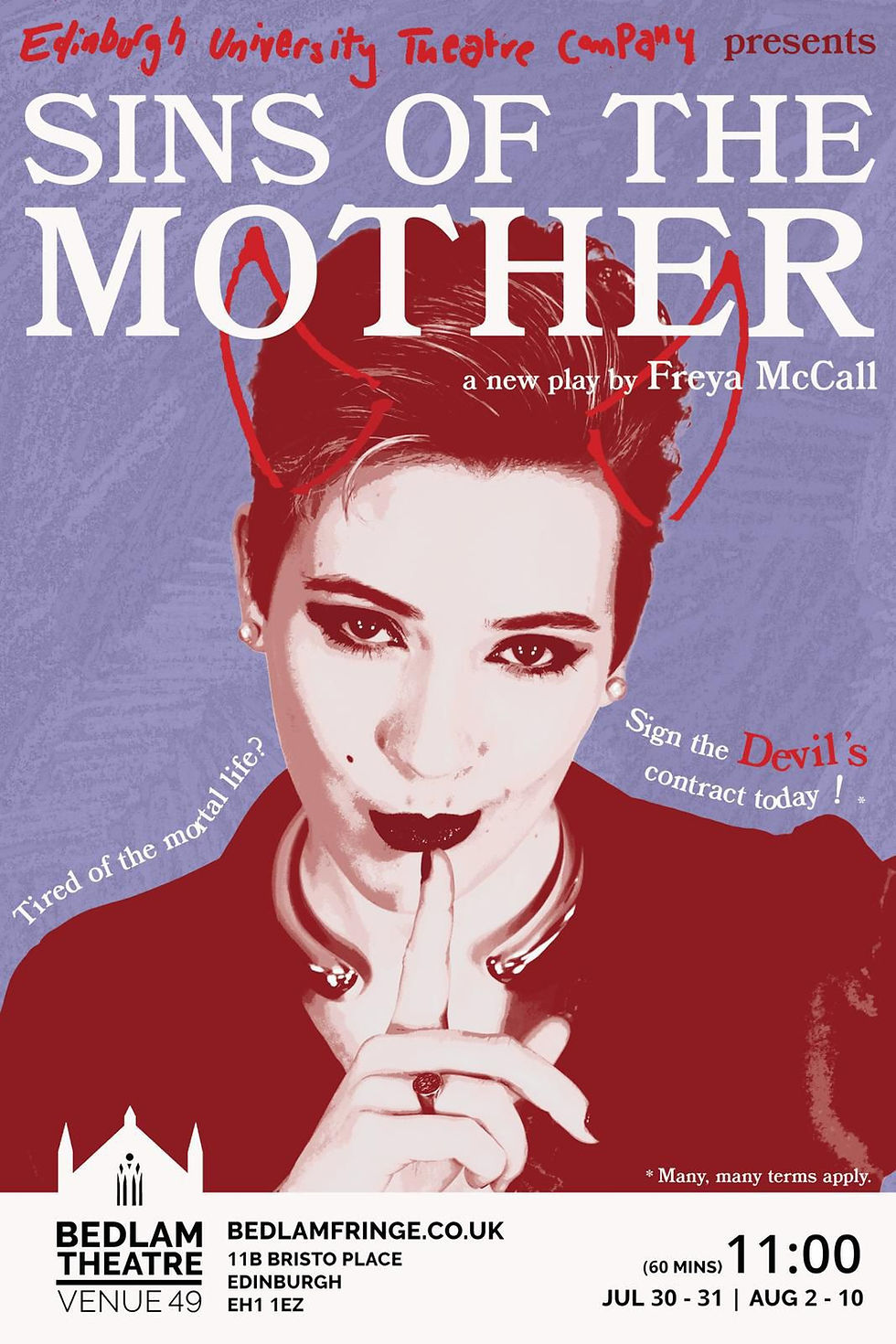Fringe 25: Sins of the Mother
- Benjamin Freckelton
- Aug 3, 2025
- 3 min read

Rating: ★★★★
‘…you have one fucked up family, Mark.’
SPOILER FREE BITESIZE
The Edinburgh University Theatre Company’s production of this piece of new writing by Freya McCall is a charming and witty whirlwind of sin and misery. The story follows the Wiggham family through three separate encounters with the Devil herself, beginning with the timely but frustrated death of Jim Wiggham in a hospital bed where he is refusing to die. Strong acting paired with technical moments contribute to the overall dark-yet-funny plot; however, the most outstanding quality of this piece is the dialogue: witty with a good control of tension, and laced through with a sense of humour just the perfect balance of dry and relaxed. EUTC’s Sins of the Mother is well worth a watch this Edinburgh Fringe.
SPOILERS FROM HERE
Like most well-constructed trilogies, the first scene of Sins would feel successful as a stand-alone piece. The play opens with an excellently stripped-back set and lighting arrangement that creates the sterile and atmospheric hospital room where Jim refuses to die. The man himself, played by Michael Butler, has all the right bearings of emotion embedded into his acting to evoke the contempt and pity of the audience, and is unwavering in his conviction. Altogether the opening of this first scene felt somewhat breath-held before the actors settled into their roles, and minor complications such as the knocking over of the IV stand were quickly recovered, to their credit. When the Devil herself arrives, played by Molly Gilbert, the highlight of the play begins: the relationship between Jim and the Devil. The juxtaposition of Butler and Gilbert alongside one another in costume, posture and delivery is
perfect for the scene, taking a dryly funny script – ‘What more could he want?’ / ‘I want to live!’ – and delivering an incredible piece of theatre.
Following on from the stand-out debut, the second, middle scene of Sins felt somewhat confused in places. In the opening we are introduced to Mark Wiggham, the grieving, unloved son of Jim, who appears human and tender. However, in the second scene it is revealed he is a ten-time serial killer, mutilating a corpse in a warehouse, attempting to contact the devil to make a bargain regarding his ex-wife. Furthermore, this scene occurs allegedly on the same day as his father’s death in scene one. This slight contrivance is somewhat confusing, with the two Marks presented to us in the scenes appearing starkly alternate. Despite this, Freya McCall presents a genuine display of character, especially in the earlier relationship between Mark and Jim, and a highlight of the scene is the hilarious moment when Mark and the Devil sit down together atop a filled body bag.
The third and final scene of Sins delivers the strongest display of the control of tension by both actors and writer, as we meet properly Mark’s ex-wife and mother of his child, Pearl, played by Eve Nugent. In this scene it is revealed, following on from the suspenseful hints of the previous scene, that Pearl has made a pact with the Devil, exchanging the soul of her daughter, Darcey, for success and fame in her medical profession. Nugent’s characterisation of Pearl is complex and thought- provoking, portraying a convincing mother-in-distress slash dubious Samaritan slash fame-seeking egomaniac, and the atmosphere built between Gilbert and Nugent is intense and powerful, and ultimately well delivered on in the final moments. Following each scene, the motif of a character – first Jim, then Mark – being pointed into hell to a backdrop of lighting and music, is strong and enjoyable, but following this third scene it pays off remarkably, as the Devil does not point Darcey off but instead holds her hand in leading her off. This also delivers on the complexity of Gilbert’s Devil as a Milton-esque fallen-angel Lucifer, thoroughly and truly evil until she’s not. In moments throughout the play this pops up with delicate charm, but is not a character trait that is ever fully explored or resolved, and McCall knows it doesn’t need to be. The Devil, with all her own issues, is simply the witness and enabler to the real story: a story of a ‘fucked up family’ navigating their awful sins.







Comments